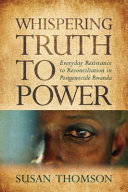
Whispering Truth to Power
By - Thomson, Susan, 1968-
Floor
-
Floor 4
ISBN 10 - 0299296741
ISBN 13 - 9780299296742
Book Status
-
1 Qnty Available with us.
Subject
-
Rwanda
Shelf No
-
5
Call Number
-
967.571 THO
Physical Description
-
XXVII, 258 p. : foto's, krt. ; 23 cm